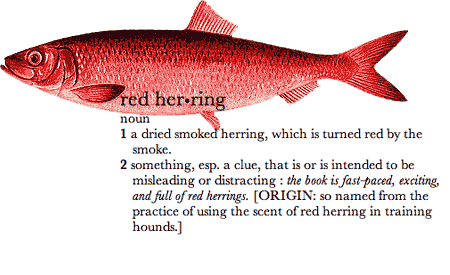Likely, you have read headlines like these:
- “Socialism Will Be 2020’s Red Herring” (February 2019)
- “Lethal Conflict between Iran and US Is A Risk, but It’s Also A ‘Red Herring’” (January 2020)
- And, lastly, with regard to former President Trumps first impeachment trial, “Trump’s ‘National Security’ Impeachment Defense Is A Red Herring” (January 2020)
But, what is this thing called a ‘red herring’ they are referring to? — Is it a type of fish, a loose thread or warning of an incoming threat?
Actually, the definition of a ‘red herring’ is none of these things but rather something that is more of a colorful alliteration.
In this piece, we will do our best to answer the vexing question as to what is and how is the term ‘Red Herring’ commonly used, particularly in combination with political-related topics.

Despite common usage, many people continue to be mystified as to ‘Red Herring’s’ intended meaning and the origins of what most would agree is a rather ‘odd’ phrase.
First off, to answer the question we posed earlier and get it out of the way, yes, it is a reference to a type of fish, that when dried, salted and smoked, is called a ‘red herring’ on account of the color it turns during the curing process.
But, in addition to the aforementioned definition, which came to prominence in 1420, ‘Red Herring’ has a dual meaning and the second one is more of a passed down Farmer’s Almanac-type idiom than that of an ‘official’ definition.
Historic in its own right, the second association is said to have been introduced in 1686, when it first appeared within an article entitled, “How to Prolong a Fox Hunt” published in a British gentlemen’s magazine. The writer, in giving advice to persons hunting foxes, recommended dragging a dead cat across the trail, as this would confuse the hounds and mask the fox’s scent. Should a cat not be unavailable, the writer suggested replacing it with a red herring.
Fast-forward 200 years later to 1884, the colorful term ‘Red Herring’ has remained ingrained in our society’s vernacular with the re-purposed meaning of ‘false clue.’

For example, consider when the political-minded website, The Hill characterized former President Trump’s attempts to delay the presidential 2020 election due to COVID restrictions as a ‘red herring.’ The Hill classified Trump’s strategy as a distraction to throw people off track as to his real reasons on why he wanted to put off the election, possibly as a tactic to prevent the inevitable?
A divisive tactic, you ask? That is one of the association’s the term ‘Red Herring’ invokes. Despite coming across sounding like an underhanded and potentially calculated move, red herrings can also be called decoys not exactly synonymous with transparency and truthfulness.
Hence, the somewhat suspect ‘red herring’ moniker can and has been used in association with a litany of political scenarios, some more nefarious than others but all with the intention of covering something up or throwing someone off the track.
According to Lorin R. Robinson, Ph.D., a writer and former chair of the journalism department at the University of Wisconsin-River Falls, “The use by politicians of diversionary tactics to distract the public from real problems or issues is as old as politics itself. “
Also known as using ‘smoke and mirrors’, the inclusion of a ‘red herring’ often is a purposeful strategy employed to evade what is factual or known to be factual.
Politicians, (especially those campaigning for office) are frequently known to change the conversation from a ‘burning, possibly inciting issue’ to one lower on the radar screen. In this scenario, the deflection may be seen as more of a strategic move than a deceitful one. For, the diversion may be viewed as necessary in order to make headway in the political arena whereby the attainment of support among disparate groups may be the ultimate goal.
Akin to an April’s Fool joke, when presented in a buddy prankster type of way, a ‘red herring’ can be a fun, playful way of keeping good news under wrap until the right to moment to make the big reveal, e.g., a wedding proposal or gender of an unborn baby.
However, thrown into what already may be a contentious situation, the intended use of a ‘red herring’ may be seen more as an act of manufactured malevolence rather than mere (harmless) mischief.
While, by and large, the interjection of a ‘Red Herring’ may be used as more of a little lie, a harmless pivot from one topic to another. Yet, when invoked to mask or cover-up something up; the degree of wantonness, can greatly vary from harmless act to that of serious violation.
The majority of the time, when the term ‘red herring’ is used in a news or political report, it is in conjunction with some form of underhanded activity.
Going back to its early days, the term, ‘Red Herring’ was incepted in a playful sporting manner. Unfortunately, like many things in society we have a tendency to take things to the nth degree whereby what may begins as a fun little exchange, if not kept in check, can quickly accelerate to a full-blown attack on one’s sensibilities.
The take-away: try and stay focused. Do your best to avoid efforts to lead you astray from what you know to be true.


